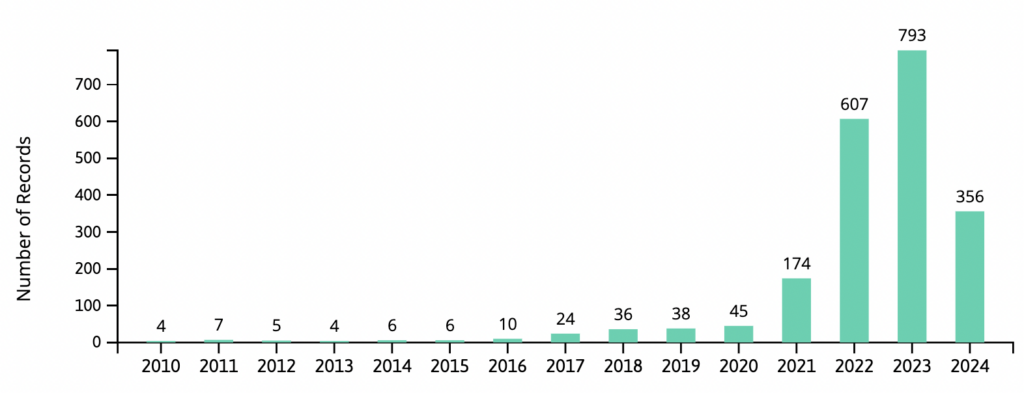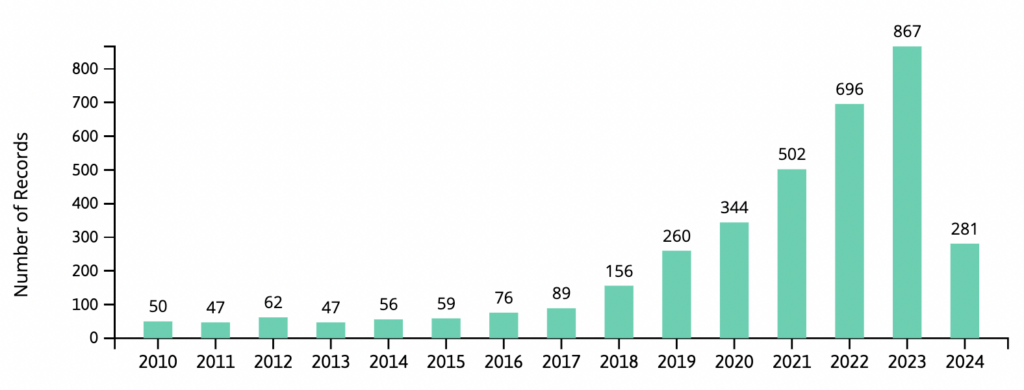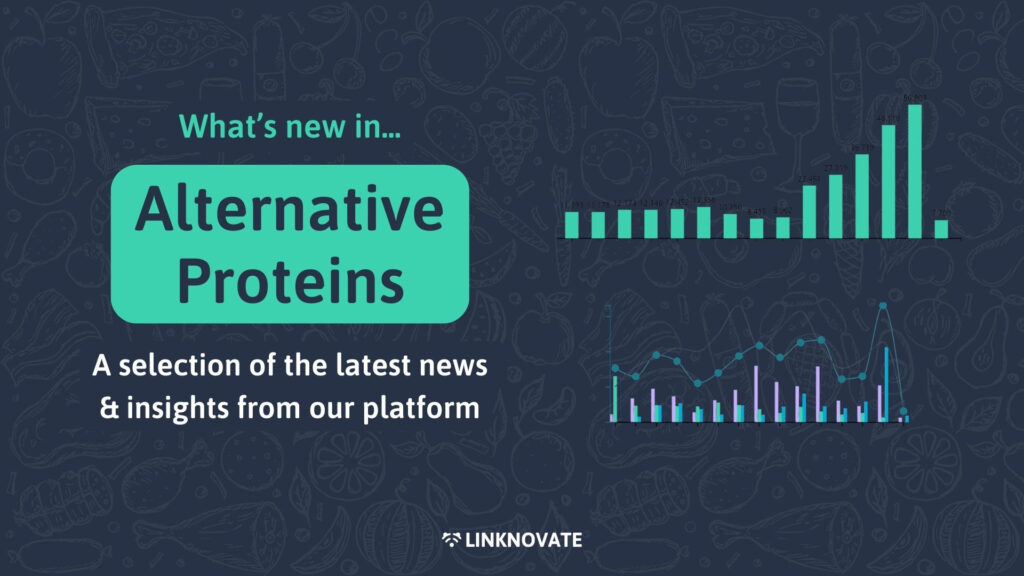The landscape of food production is undergoing a significant transformation. Driven by advancements in science and technology, a growing number of alternative protein sources are entering the market worldwide. These innovations offer the potential to address critical challenges related to sustainability, ethics, and dietary needs.
This article explores the burgeoning field of alternative proteins, examining five trends that are emerging in this growing field and highlighting the top food tech companies and startups leading the charge in this area.

If you want to dive deeper into the latest news and insights in alternative protein tech, don’t miss our free mini-report on the topic.
1. Precision Fermentation: Revitalizing Traditional Techniques
Fermentation is an ancient technique experiencing a modern revival in food-tech. By harnessing the power of microbes, fermentation can produce a wide array of alternative proteins, offering sustainable and diverse food options. This trend includes air proteins, a technique that allows making food out of air – utilizing microorganisms to convert elements from the air, such as carbon dioxide, into nutritious proteins.
Innovators Utilizing Fermentation:
- Formo bio: Utilizing precision fermentation, Formo Bio employs engineered microbes to create animal-free dairy and egg products, providing sustainable and ethical options for health-conscious and animal welfare-focused consumers.
- Air Protein is a startup that focuses on the production of proteins based on microorganisms fed with air elements, such as carbon dioxide. In this way, it does not rely on traditional crops and presents itself as a sustainable and efficient alternative to produce protein food.
- Pacifico Biolabs is developing alternative seafood through a unique approach to making whole muscle structures using fermentation. Their biomass fermentation process cultivates various microorganisms, including mycelium, to deliver the same texture and taste of fish products.

2. Cellular Agriculture: Cultivating a Sustainable Future
Cellular agriculture is an innovative technique that produces meat and other animal products directly from cell cultures, eliminating the need for breeding or slaughtering animals. This process involves growing either real animal cells or other types of cells in a controlled environment, offering a more sustainable and ethical alternative to traditional meat production. Since its applications with animal tissue, also called cultured meat, is highly debated, some innovative companies have pioneered its development through plant-based cells. Among them:
- Luyef: this Chilean food tech startup is the producer of TAMEE, a proprietary animal-free meat product. TAMEE is a bovine myoglobin-based proprietary ingredient that is added to plant-based material to alter the structure, feel, and taste and make it more similar to animal-derived meat.
- Core Biogenesis: a French startup delivering next-generation growth factors for stem cells and cell-based applications. Core Factors, which are plant-based recombinant growth factors (GF), are developed through its molecular farming platform.
- Tiamat Sciences: This US startup disrupts traditional biomolecule production with plant molecular farming (PMF). Their platform and plant bioreactors are specifically designed for cultivated meat production. The company utilizes a data-driven approach, leveraging transient gene expression and vertical farming, to deliver animal-free recombinant proteins and biomolecules.

3. 3D Food Printing: Customizing Culinary Creations
3D food printing is revolutionizing gastronomic creation, enabling precise customization of dishes, the crafting of innovative edible structures, and the exploration of complex flavors. This technology challenges traditional culinary boundaries and promotes sustainability by investigating edible packaging and using alternative ingredients.

Pioneers in 3D Food Printing:
- Redefine Meat: Focusing on soy and wheat-based products, Redefine Meat supplies meat alternatives to food service and retail channels, aiming to redefine the meat substitute category.
- Matrix F.T.: this biotech company is a manufacturer of fibrous, edible, animal component-free, plant-based, customizable nanofiber scaffolds and microcarriers. This startup uses innovative scaffolds to tailor cell growth for diverse nutritional needs and achieve realistic meat textures.
- Sugar Lab: The world’s first ‘digital bakery,’ it utilizes 3D printing technology to create sweets and chocolates in intricate shapes and designs, merging culinary artistry with cutting-edge technology. They offer bespoke, artisanal confections crafted through a meticulous process, blending traditional culinary expertise with innovative 3D printing techniques.
4. Microalgae Cultivation: Harnessing Nature’s Powerhouses
Microalgae cultivation offers a sustainable solution for protein and nutrient production. These small aquatic organisms efficiently convert sunlight into energy, providing a promising source of proteins, oils, and various nutrients. Their nutritional versatility integrates seamlessly into food products, dietary supplements, and biofuels.
Innovators in Microalgae Cultivation:
- Quazy Foods: is a Berlin-based biotech startup, pioneer in the use of microalgae as a sustainable, high-quality source of functional ingredients. Their innovative biomass fermentation technique produces proteins and compounds that are great eco-friendly alternatives to traditional animal-based or synthetic ingredients.
- Algrow Biosciences leverages microalgae to create versatile bio-ingredients for the food industry. Their innovative process utilizes upcycled co-products and a proprietary technology to remove pigments and unwanted flavors from microalgae, maximizing its potential in various food applications.
- Mewery: This Czech food tech startup is producer of the world’s first cultivated pork-microalgae burger. Their ongoing efforts include optimizing cell lines for efficient production, developing novel growth factors for enhanced performance, and establishing scalable bioprocesses.

5. Mycelium: Unlock the Natural Power of Fungi
This trend utilizes the fibrous network of fungi, known as mycelium, as a base for creating novel plant-based products. The production process of mycelium-based foods characterizes for unique sustainability, since mycelium can be grown on a variety of waste streams like agricultural byproducts, making it a very resource-efficient protein source. At the same time, fungi have a high nutritional potential, since some strains of mycelium are naturally high in protein, fiber, and even certain vitamins and minerals.
Among the companies that are reinventing the use of mushroom in the food industry are:
- Ecovative Design: This company started by developing sustainable packaging materials using mycelium and has now expanded into creating plant-based food products. Their spin-off MyFOREST produces a meat alternative using mycelium to create a base with a meaty texture.
- Infinite Roots: Formerly known as Mushlabs, this biotech German company addresses the global challenge of sustainable and equitable food production. They cultivate mycelium in space-saving fermentation tanks using natural side streams like brewers’ spent grain (a by-product of the beer industry).
- Nature’s Fynd: This California-based startup has created a unique protein source called “Fy” using a proprietary strain of fungi. Their focus is on creating complete protein sources with a neutral flavor profile, making them suitable for a variety of plant-based applications.
If you’re curiosity about the new applications of mycelium in other industries including textile, biotech, building materials, and manufacturing, don’t miss our free mini-report on the latest insights and news on mycelium tech:
Towards a more sustainable food technology
The alternative proteins market is at the forefront of FoodTech innovation, driven by cutting-edge techniques like precision fermentation, cellular agriculture, 3D food printing, microalgae cultivation, air proteins, and mycelium technnology. With the global alternative protein market projected to grow significantly, driven by increasing consumer demand for sustainable and nutritious food options, these trends hold the promise of a more sustainable, nutritious, and diverse food future.
If you want to dive deeper into the latest news and insights in alternative protein tech, don’t miss our free mini-report on the topic to find the latest insights, news, publication, and patents about plan-based food technologies.






